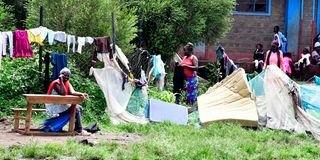For fair climate, consider gender justice

Residents of Bosnia in Kahawa Wendani who sought refuge at Kahawa Wendani Primary School on May 01, 2024 after heavy rains flooded their homes. They are now seeking support to rebuild their lives.
Natural disasters have become severer and more frequent with devastating effects for communities. Over the past month, Kenya has experienced recurring flood crises that disproportionately affect vulnerable populations, particularly women and girls in all their diversities.
The impact of natural disasters on sexual and reproductive health (SRH) is a critical yet oft-overlooked aspect of reproductive justice. Women and girls are among the most vulnerable to disaster, facing heightened risks of violence, displacement, gender inequalities and socioeconomic insecurity.
The reproductive right is a human right but, in the face of natural disasters in Kenya, has been compromised, especially for women and girls in informal communities, who face increased vulnerability to gender-based violence, including sexual assault and exploitation, amid scarce resources. Lack of access to SRH services jeopardises their physical health and undermines their autonomy and intervention.
Climate justice is linked to gender justice. The impacts of climate change are not gender-neutral and addressing the challenges requires a holistic and intersectional approach centring on needs and rights. We must prioritise and implement inclusive solutions that address the root causes of environmental degradation and build resilient communities.
That means involving women and girls in decision-making, ensuring their access to quality healthcare services and promoting gender equality in all aspects of disaster response and recovery. That will ensure even during crises all are empowered to make informed decisions about their reproductive lives.
Ms Kathia, a communications specialist, is a human rights defender with NAYA Kenya [email protected].





